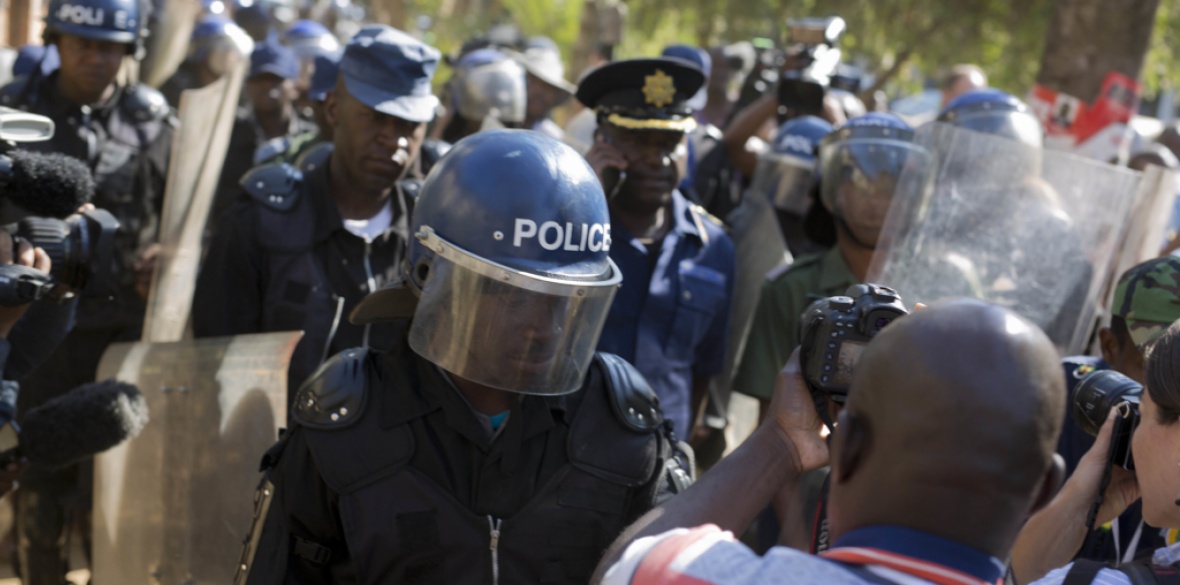This is the last article you can read this month
You can read more article this month
You can read more articles this month
Sorry your limit is up for this month
Reset on:
Please help support the Morning Star by subscribing here
USING live fire against demonstrators, as Zimbabwe’s security forces have done in Harare, killing at least six people, will worry those hoping for real democratic change after Robert Mugabe’s removal.
If President Emmerson Mnangagwa’s rhetoric about Zimbabweans being “divided at the polls [but] united in our dreams” and joining hands for “a new beginning” is to have any substance, the repressive tactics of the past have no place.
Unfortunately, the security forces were not the sole contributors to the bloodshed, since the conduct of MDC Alliance presidential candidate Nelson Chamisa took on an all-or-nothing character.
Aware backing by the governments and media of the US, Britain and the European Union, Chamisa’s campaign assumed an air of entitlement, modelled on the “colour revolutions” of eastern Europe.
Barely before the polls were closed, he and his alliance declared victory, demanding that this be recognised, with the implied threat that failure to do so would result in people thronging the streets and paralysing government.
The electoral authorities declared the result in the face of Chamisa’s claims of a “fake vote,” “corrupted results” and a “coup against [the people's] will,” which were disavowed by polling monitors.
That the opposition alliance would triumph in the main cities of Harare and Bulawayo was never in doubt.
Bulawayo was the main stronghold, along with Matabeleland, of the Zimbabwe African People’s Union, headed originally by independence father Joshua Nkomo, which was absorbed into the Patriotic Front with Mugabe’s Zimbabwe African National Union (Zanu) before its leaders and supporters were purged militarily and politically.
And working people in Harare, even Zanu-PF supporters, had been alienated by the Mugabe government’s resort to neoliberalism in the 1990s at the behest of the International Monetary Fund and World Bank.
The Zimbabwe Congress of Trade Unions (ZCTU), based largely in the cities, was strongly opposed to the neoliberal turn, seeing its results in lower living standards and growing unemployment for its members.
It was for these reasons that the ZCTU threw its weight behind efforts to establish the Movement for Democratic Change, headed by the late Morgan Tsvangirai.
Since those days the urban areas have been an electoral desert for Zanu (PF), but the reverse has been true for the country’s vast rural hinterland, which bore the brunt of the independence war and where Zanu (PF) is still seen as the liberation movement.
The cachet of the Zanu (PF) name, plus other considerations including the role of traditional tribal leaders and the attraction of patronage, not least over land rights in the wake of government-encouraged takeovers of properties belonging to commercial farmers, meant that Mnangagwa would always tend to have the advantage in the countryside.
And there are more seats in rural constituencies than in urban areas.
An added complication for Chamisa was the manner in which his selection as MDC alliance representative was seen to have been driven through without adequate consultation, reaffirming his self-image as the anointed one.
There is little to be gained for Zimbabwe’s working people, either urban or rural, in banging their heads against a brick wall or police batons to demand that Mnangagwa’s election be reversed.
Far better to take up the offer by the president and his party to reach across the partisan divide and begin working on a national approach that puts people’s living standards first and puts flesh on the bones of a liberation programme.
Zimbabwe’s people would benefit from a reduction of social tensions, especially those stoked from outside, to concentrate on a new beginning.










